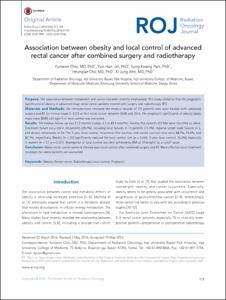KUMEL Repository
1. Journal Papers (연구논문)
1. School of Medicine (의과대학)
Dept. of Molecular Medicine (분자의학)
Association between obesity and local control of advanced rectal cancer after combined surgery and radiotherapy
- Keimyung Author(s)
- Lee, Yun Han
- Department
- Dept. of Molecular Medicine (분자의학)
- Journal Title
- Radiation Oncology Journal
- Issued Date
- 2016
- Volume
- 34
- Issue
- 2
- Keyword
- Obesity; Rectal cancer; Radiotherapy; Local control; Prognosis
- Abstract
- Purpose: The association between metabolism and cancer has been recently emphasized. This study aimed to find the prognostic
significance of obesity in advanced stage rectal cancer patients treated with surgery and radiotherapy (RT).
Materials and Methods: We retrospectively reviewed the medical records of 111 patients who were treated with combined
surgery and RT for clinical stage 2–3 (T3 or N+) rectal cancer between 2008 and 2014. The prognostic significance of obesity (body
mass index [BMI] ≥25 kg/m2) in local control was evaluated.
Results: The median follow-up was 31.2 months (range, 4.1 to 85.7 months). Twenty-five patients (22.5%) were classified as obese.
Treatment failure occurred in 33 patients (29.7%), including local failures in 13 patients (11.7%), regional lymph node failures in 5,
and distant metastases in 24. The 3-year local control, recurrence-free survival, and overall survival rates were 88.7%, 73.6%, and
87.7%, respectively. Obesity (n = 25) significantly reduced the local control rate (p = 0.045; 3-year local control, 76.2%), especially
in women (n = 37, p = 0.021). Segregation of local control was best achieved by BMI of 25.6 kg/m2 as a cutoff value.
Conclusion: Obese rectal cancer patients showed poor local control after combined surgery and RT. More effective local treatment
strategies for obese patients are warranted.
- Keimyung Author(s)(Kor)
- 이윤한
- Publisher
- School of Medicine
- Citation
- Yunseon Choi et al. (2016). Association between obesity and local control of advanced rectal cancer after combined surgery and radiotherapy. Radiation Oncology Journal, 34(2), 113–120. doi: 10.3857/roj.2016.01725
- Type
- Article
- ISSN
- 2234-1900
- Appears in Collections:
- 1. School of Medicine (의과대학) > Dept. of Molecular Medicine (분자의학)
- 파일 목록
-
-
Download
 oak-2016-0016.pdf
기타 데이터 / 495.38 kB / Adobe PDF
oak-2016-0016.pdf
기타 데이터 / 495.38 kB / Adobe PDF
-
Items in Repository are protected by copyright, with all rights reserved, unless otherwise indicated.